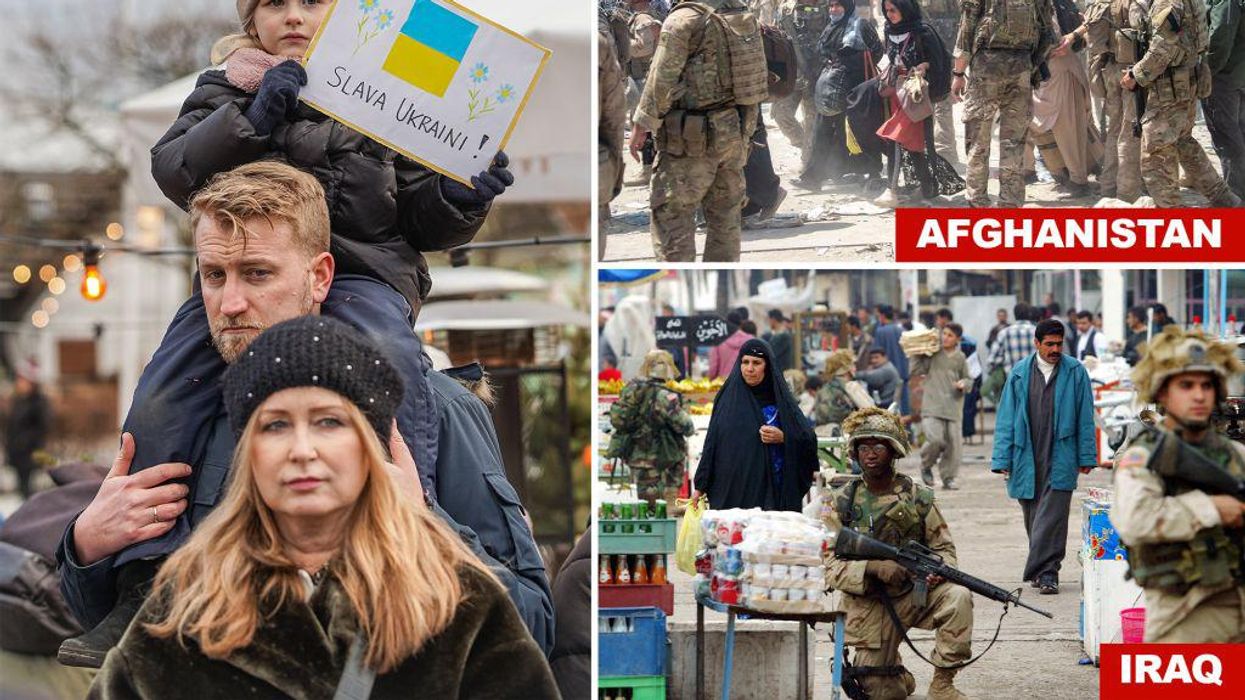Xenophobia And White Supremacy Mar Coverage Of Ukraine Conflict
If you’ve been gathering proof that white supremacy drives western media coverage of international affairs, look no further than coverage of the Russian invasion into Ukraine. Charlie D’Agata, a CBS News senior correspondent in Kyiv, described Ukrainian citizens hiding in bomb shelters and tens of thousands of people trying to flee the city of Kyiv on Friday. Those people have been getting nonstop media coverage since Russian military forces launched a major attack on Ukraine on Thursday, but by activists’ estimates, they likely would’ve been ignored completely if they were Black, brown, or Muslim.
D’Agata’s synopsis of the attack seemed to lend evidence to that estimation. “But this isn’t a place—with all due respect—like Iraq or Afghanistan that has seen conflict raging for decades,” D’Agata said of Ukraine. “You know, this is a relatively civilized, relatively European—I have to choose those words carefully, too—city where you wouldn’t expect that, or hope that it’s going to happen.”
Saad Mohseni, director of the media company Moby Media Group in Afghanistan, called the statement "utterly stupid and ill informed" in a tweet on Saturday. “Afghanistan was also a peaceful and ‘civilised’ place in 1979 before the Soviets invaded (and became the battle zone between the West and Soviet block),” Mohseni tweeted. “Ditto for Iraq (before the American attack in 2003).”
Human rights lawyer Qasim Rashid called the CBS correspondent's response "overt white supremacy," an "absolutely disgusting dehumanization of people of color."
“White supremacy,” Rashid wrote, “is when Europe has launched two World Wars in the last century but it's Iraq & Afghanistan—two nations relentlessly bombed by western & European nations for 40 years—that are ‘uncivilized.’ This is how media dehumanizes BIPOC & normalizes white supremacy.”
Of course, D’Agata responded to criticism about the racist rhetoric with an apology.
“I spoke in a way that I regret, and for that I’m sorry,” he said. “What I’d hope to convey is that what’s unique about the fighting underway here is that this country has not really seen this scale of war in recent years unlike some conflicts in countries I’ve covered that have tragically suffered through many years of fighting.
“You should never compare conflicts anyway. Each one is unique. I’ve dedicated much of my career to telling the story of suffering through any of these wars, wherever they may be. I used a poor choice of words, and I apologize for any offense I may have caused.”
Oh, how I wish this were simply about one journalist’s poor choice of words. It just is not.
Author Alan Macleod posted tweet after tweet of journalists and politicians alike reinforcing the same double standard, with empathy seemingly bestowed according to skin color.
David Sakvarelidze, Ukraine’s deputy chief prosecutor, said on BBC: “It’s really emotional for me because I see European people with blue eyes and blonde hair being killed.”
Journalist Peter Dobbie used these words to describe Ukrainian refugees on Al Jazeera: "What's compelling is looking at them, the way they are dressed. These are prosperous, middle-class people. These are not obviously refugees trying to get away from the Middle East … or North Africa. They look like any European family that you'd live next door to."
In a column for The Telegraph, dubbed "Vladimir Putin’s monstrous invasion is an attack on civilisation itself," Daniel Hannan wrote of Ukrainian victims: “They seem so like us. That is what makes it so shocking. Ukraine is a European country. Its people watch Netflix and have Instagram accounts, vote in free elections and read uncensored newspapers. War is no longer something visited upon impoverished and remote populations. It can happen to anyone.”
Social media users didn’t hesitate to bring to international attention just how many of those “impoverished” populations became “impoverished.” In a phrase: Western interference.
When Paul Massaro, countercorruption adviser to Congress, tweeted that he was "racking" his brain "for a historical parallel to the courage and fighting spirit of the Ukrainians and coming up empty," activist Stanley Cohen responded: "Ever heard of Palestine? Its only been 74 years."
Reprinted with permission from Daily Kos











